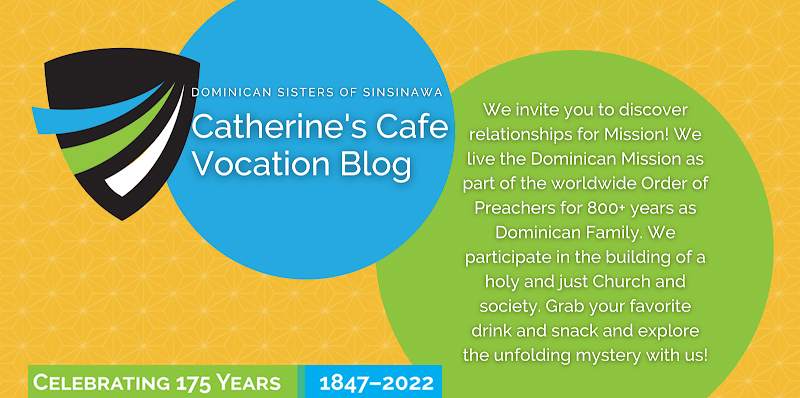"High-Risk Living"
 This past week the RFM team brought together the new
members for a series of activities and chats around congregational history and
finance. We did a lot of reading about the historical context and origin
of the Sinsinawas Dominicans and visited several sites of Fr. Mazzuchelli’s
footprint in the area. Various groups of sisters graciously shared their
experiences of the more recent history of the congregation and the different
challenges that emerged. There was also a session with our Treasurer to
discuss how we live the vow of poverty and how the congregation as a whole
manages its resources. In Sister Mary Ellen Butcher’s remembrance she
describes our kind of common life as one of “high-risk living” in which we lose
control and “do not feather our own nest”. What a wonderful and true
depiction of what I’ve seen in all the sisters I know.
This past week the RFM team brought together the new
members for a series of activities and chats around congregational history and
finance. We did a lot of reading about the historical context and origin
of the Sinsinawas Dominicans and visited several sites of Fr. Mazzuchelli’s
footprint in the area. Various groups of sisters graciously shared their
experiences of the more recent history of the congregation and the different
challenges that emerged. There was also a session with our Treasurer to
discuss how we live the vow of poverty and how the congregation as a whole
manages its resources. In Sister Mary Ellen Butcher’s remembrance she
describes our kind of common life as one of “high-risk living” in which we lose
control and “do not feather our own nest”. What a wonderful and true
depiction of what I’ve seen in all the sisters I know.
The past couple of days I've been pondering it all and
questioning what it means moving forward. I've found myself coming
back to something said by a Maryknoll sister as she talked about her years in
South Sudan at the peak of the war. Despite very real and constant
threats to her life she chose to remain on mission in solidarity with the
people in her community. In response to my look of disbelief she said,
rather matter-of-factly "Prudence is the art of risk-taking."
The words prudent and risk-taking at first seemed contradictory to me,
but a deeper wisdom is sinking in.
Learning about the Sinsinawa Dominican history and
finances gave me a glimpse into the past experiences of the congregation and
how the organizational culture has evolved and changed. Just as the times
have changed, our propensity for taking risks has looked different at various
points during our history. The existence of the congregation today is the
result of very risky decisions made by a few courageous individuals—hence their
recognition as the “Cornerstones”. Since the our inception, we have
demonstrated our willingness to take risks—often it was only in taking those
risks that possibilities for leadership, personal growth and innovation opened
up for us. Of course, there were also occasions when we took risks that
ended badly (such is the nature of risk-taking!). In general, though,
it’s clear that Providence has provided and continues to provide for the
Sinsinawa Dominicans.
What can our history and our current reality reveal about
our risk-taking patterns and what perceptions are rooted in the congregational
history and experience?
To what degree are cultural injunctions encouraging or
deterring us to take prudent risks?
As an organization, which of these age-old mottos do we
espouse and when: "Nothing ventured, nothing gained" or
"Better safe than sorry"?
Quincy Howard, Candidate
Sinsinawa, WI




Comments
Post a Comment